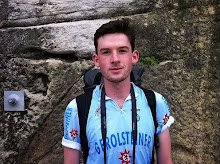Elke Moltrecht
On July 6th i went to a workshop as part of the Liquid Architecture festival that was running across Sydney, Melbourne and Brisbane at the time.
Berlin-based Sound Curator Elke Moltrecht was a guest of RMIT and presented a history of her career as a curator of sound art and experimental music for several cultural institutions in Berlin over the last 15 years.
Initially Elke talked about growing up in East Germany before reunification, and the difficulty of discovering new music that was not government approved. A network of people smuggled reel to reel tapes through the borders, people who worked for embassies and others who were allowed a higher level of freedom. Being a devoted music listener was a serious business, with the possibility of arrest if record collections were discovered. The music which got through was a strange mix of pop and avant garde, the only two names I can remember were Cabaret Voltaire and Pere Ubu. After the fall of the wall the unfettered access to record stores and large amounts of music caused her to pause and reconstruct her relationship with music, it took a full year for her to grow comfortable enough to begin buying records.
After studying classical music she was employed to create a “memory house” for a famous german composer. later in her career she moved into the sound art field, curating displays and events for various contemporary sound movements. She basically said that writing a good grant application was one of the most important skills, and achieving a good balance between artists, so that one guest artist provided funding to afford the next one. finding artists who had a connection with what you were attempting to do was important, money should not be the dominant driving force, and making connections with artists that would draw a large crowd, but were prepared to perform for lower prices because what you were offering them was concurrent with their interests was how to get the best outcome for everyone involved.
it was a decent talk, but with the blinds down in the dark it was pretty hard to stay awake, so i left at the lunch break, and went and bought a record, so anyway here's the synopsis i stole,
Elke Moltrecht has been curating sound events since the early 90s working at institutions including the Podewil Centre for Contemporary Art and the Ballhaus Nauynstrasse. She is now a freelance curator working on a variety of cross cultural projects that promote the diversity of music and sound art occurring in atypical locations including Turkey, Lebanon and Korea.
Berlin-based Sound Curator Elke Moltrecht was a guest of RMIT and presented a history of her career as a curator of sound art and experimental music for several cultural institutions in Berlin over the last 15 years.
Initially Elke talked about growing up in East Germany before reunification, and the difficulty of discovering new music that was not government approved. A network of people smuggled reel to reel tapes through the borders, people who worked for embassies and others who were allowed a higher level of freedom. Being a devoted music listener was a serious business, with the possibility of arrest if record collections were discovered. The music which got through was a strange mix of pop and avant garde, the only two names I can remember were Cabaret Voltaire and Pere Ubu. After the fall of the wall the unfettered access to record stores and large amounts of music caused her to pause and reconstruct her relationship with music, it took a full year for her to grow comfortable enough to begin buying records.
After studying classical music she was employed to create a “memory house” for a famous german composer. later in her career she moved into the sound art field, curating displays and events for various contemporary sound movements. She basically said that writing a good grant application was one of the most important skills, and achieving a good balance between artists, so that one guest artist provided funding to afford the next one. finding artists who had a connection with what you were attempting to do was important, money should not be the dominant driving force, and making connections with artists that would draw a large crowd, but were prepared to perform for lower prices because what you were offering them was concurrent with their interests was how to get the best outcome for everyone involved.
it was a decent talk, but with the blinds down in the dark it was pretty hard to stay awake, so i left at the lunch break, and went and bought a record, so anyway here's the synopsis i stole,
Elke Moltrecht has been curating sound events since the early 90s working at institutions including the Podewil Centre for Contemporary Art and the Ballhaus Nauynstrasse. She is now a freelance curator working on a variety of cross cultural projects that promote the diversity of music and sound art occurring in atypical locations including Turkey, Lebanon and Korea.
Labels: lecture, liquid architecture, sound art


0 Comments:
Post a Comment
<< Home